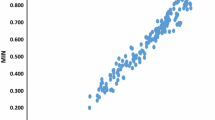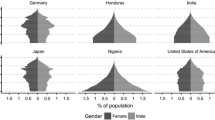Abstract
In this paper, we investigate the choice ofprincipal variables for computing three humandevelopment indicators, namely, the HumanDevelopment Index (HDI), the Gender-RelatedDevelopment Index (GDI), and the GenderEmpowerment Measure (GEM). To this end, datafrom the 1999 Human Development Reportare used. Empirical results providejustification for selecting only one componentof each indicator. The paper also suggests analternative weighting scheme should all thethree components of each indicator be retained.The implications of these results fordevelopment policy are discussed.
Similar content being viewed by others
REFERENCES
Bardhan, K. and S. Klasen: 1999, 'UNDP's Gender-Related Indices: a critical review',World Development 27, pp. 985-1010.
Dasgupta, R. and M. Weale: 1992, 'On measuring the quality of life', World Development 20, pp. 119-131.
Dijkstra, A. G.: 2002, 'Revisiting UNDP's GDI and GEM: towards an alternative', Social Indicators Research 57, pp. 301-338.
Dunteman, G. H.: 1989, Principal components analysis (Sage Publications, Newbury Park, California).
Hicks, N. and P. Streteen: 1979, 'Indicators of development: the search for a basic needs yardstick', World Development 7, pp. 567-580.
Hopkins, M.: 1991, 'Human Development revisited: a new UNDP report,' World Development 19, pp. 1469-1473.
Jolliffe, I. T.: 1972, 'Discarding variables in a principal component analysis. I. Artificial data', Applied Statistics 21, pp. 160-173.
Jolliffe, I. T.: 1973, 'Discarding variables in a principal component analysis. II. Real data', Applied Statistics 22, pp. 21-31.
McGillivray, M.: 1991, 'The Human Development Index: yet another redundant composite development indicator?', World Development 19, pp. 1461-1468.
McGillivray, M. and H. White: 1993, 'Measuring development? The UNDPs Human Development Index', Journal of International Development 5, pp. 193-205.
Morrison, D. F.: 1967, Multivariate statistical methods (McGraw-Hill, New York).
Ogwang, T.: 1994, The choice of principal variables for computing the Human Development Index', World Development 22, pp. 2011-2014.
Pillarisetti, J. R. and M. McGillivray: 1998, 'Human Development and Gender Empowerment: methodological and measurement issues', Development Policy Review 6, pp. 197-209.
Ram, R.: 1982, 'Composite indices of physical quality of life, basic needs fulfilment and income: a principal component representation', Journal of Development Economics 11, pp. 227-247.
Rao, V. V. B.: 1991, 'Human Development Report 1990: review and assessment', World Development 19, pp. 1451-1460.
Srivastavan, T. N.: 1994, Human Development: a new paradigm or reinvention of the wheel?', American Economic Review Papers and Proceedings 84, pp. 238-243.
Streteen, P.: 1994, Human Development: means and ends', American Economic Review Papers and Proceedings 84, pp. 238-243.
United Nations Development Programme: 1990, Human Development Report 1990 (Oxford University Press, New York).
United Nations Development Programme: 1993, Human Development Report 1993 (Oxford University Press, New York).
United Nations Development Programme: 1994, Human Development Report 1994 (Oxford University Press, New York).
United Nations Development Programme: 1995, Human Development Report 1995 (Oxford University Press, New York).
United Nations Development Programme: 1999, Human Development Report 1999 (Oxford University Press, New York).
Author information
Authors and Affiliations
Corresponding author
Rights and permissions
About this article
Cite this article
Ogwang, T., Abdou, A. The Choice of Principal Variables for Computing some Measures of Human Well-being. Social Indicators Research 64, 139–152 (2003). https://doi.org/10.1023/A:1024788123572
Issue Date:
DOI: https://doi.org/10.1023/A:1024788123572




